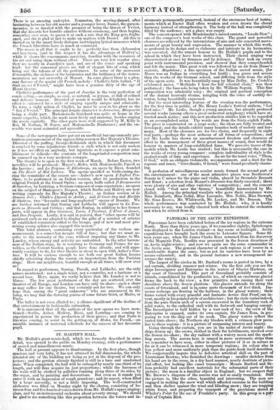Some of the newspapers have put out an unofficial but
uncommonly pre-. .tentious announcement of the approaching season at Her Majesty's Theatre. Divested of the puffing, George-Robinsish style in which this document is couched by some injudicious friend—a style which is not only useless as it has no effect on anybody, but injurious as it exposes a great esta- blishment to ridicule—the contents of the longwinded composition may be summed up in a very moderate compass.
The theatre is to open in the first week of March. Before Easter, two novelties will be produced : Mayer's Medea, with Mademoiselle Parodi as the heroine ; and La Prigione di Edimburgo, an opera by Ricci, founded on The Heart of Mid Lothian. The operas specified as forthcoming du- ring the remainder of the season are—Auber's new opera DEnfant Pro- digue, to be performed in an Italian version, after its production in the original French at the Grand Opera ; an opera buffa called Il Burgomestre di 8aarda m, by Lortzing, a German composer of some reputation ; an opera on the subject of Sbakspere's Tempest, which Scribe and Ilalevy are now writing expressly for Her Majesty's Theatre ; an Italian version of Le Domino Noir ; GILA' s Ifigenia in Aultde ; and Il Conte Ory and Matilda -di Shabran, two "favourite and long-neglected " operas of Rossini. We are further informed that Sontag and Lablache will appear in La Tem- pesta as Miranda and Caliban ; and that Sontag, in addition to her former parts, will appear in Dan Giovanni, Lucia, I Puritani, L'Elisir d' Amore, and Don Pasquale. Lastly, it is said in general, that "other operas will be produced such as are adapted to display the gifts of a number of artistes of established reputation added to the troupe, and of new and most pro- mising young artistes also engaged this season." This brief abstract, containing every particular of the verbose an- nouncement, is a somewhat meagre bill of fare; but that we must as- cribe to the necessity of the case, without imputing any blame to Mr. Lumley, whose energy and activity are undoubted. In the utter barren- ness of the Italian stage, he is resorting to Germany and France for no- velties, as the Covent Garden people have done already, and will appa- rently continue to do, for their theatre is about to open with Aubcr's Gus- tave. It will be curious enough to see both our great Italian houses chiefly subsisting during the season on importations from the Parisian -stage. How our neighbours, boastful enough at all times, will crow over us !
In regard to performers, Sontag, Parodi, and Lablache, are the only names mentioned: not a single tenor, not a contralto, not a baritone or a second bass. Here, again, we verily believe that Mr. Lumley is not to blame. The few great performers of the day are scattered over the theatres of all Europe, and London can have only its share—such a share as may suffice for one theatre, but certainly not for two. We can only hope that, among the " great unknown " who are announced in the lump, we may find the dawning genius of some future Grisi, or Mario, or Pasta.
The ballet is not even alluded to ; a silence significant of the decline of that entertainment in fashionable estimation.
It is announced that all the authors of the new operas we have men- tioned—Scribe, Auber, Halevy, Ricci, and Lortzing—are coming to superintend in person the production of their pieces • and that Pasta is likewise coming, to assist in the getting-up of Medea, for Parodi,—an amiable instance of maternal solicitude for the success of her favourite


























 Previous page
Previous page